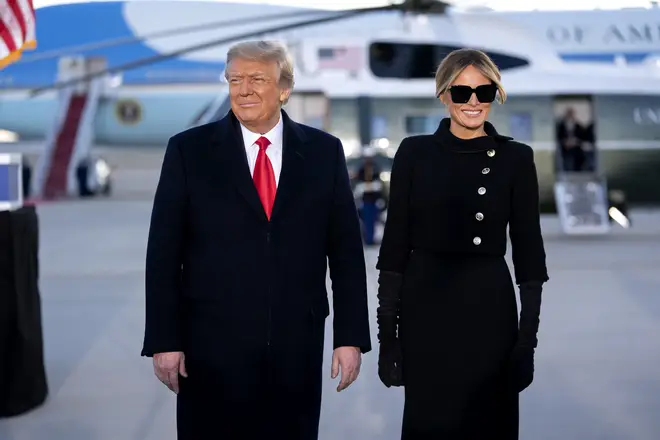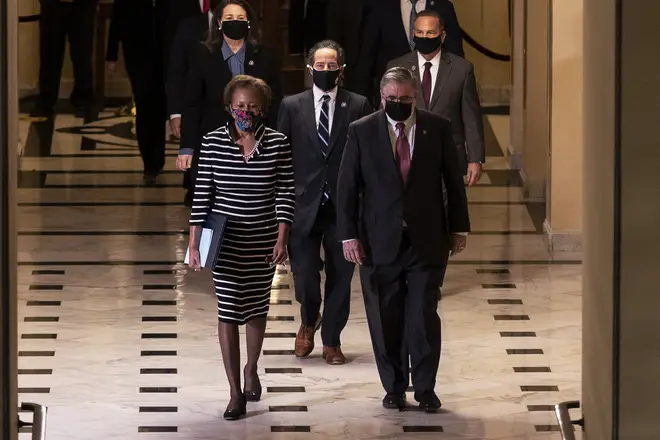
Boxing Day Special with Shelagh Fogarty 1pm - 3pm
26 January 2021, 00:32 | Updated: 26 January 2021, 00:44

The start of former President Donald Trump's second impeachment trial was formally triggered on Monday evening after the charge against him was delivered to the Senate.
Democrats from the House of Representatives carried the sole impeachment charge of "incitement of insurrection" across the Capitol late on Monday evening in a rare and ceremonial walk to the Senate by the prosecutors who will argue their case.
The trial, which is set to start on 8 February, will be led by the Senate's longest-serving member, Democrat Patrick Leahy.
Lead Impeachment Manager Representative Jamie Raskin read the charge against Trump, the first President in history to be impeached twice.
Senators will be sworn-in as jurors on Tuesday.

Democrats would need the support of 17 Republicans - a high bar - to convict him.
Democrats are hoping that strong Republican denunciations of Mr Trump after the January 6 riot at the Capitol will translate into a conviction and a separate vote to bar Mr Trump from holding office again.
But instead, Republican passions appear to have cooled since the insurrection.
Now that Mr Trump's presidency is over, Republican senators who will serve as jurors in the trial are rallying to his legal defence, as they did during his first impeachment trial last year.
Senator Marco Rubio said: "I think the trial is stupid, I think it's counterproductive. The first chance I get to vote to end this trial, I'll do it."
Mr Trump is the first former president to face an impeachment trial, and it will test his grip on the Republican Party as well as the legacy of his tenure, which came to a close as a mob of loyal supporters heeded his rally cry by storming the Capitol and trying to overturn President Joe Biden's election.
The proceedings will also force Democrats, who have a full sweep of party control of the White House and Congress, to balance their promise to hold the former president accountable while also rushing to deliver on Mr Biden's priorities.
Arguments in the Senate trial will begin on the week of February 8. Leaders in both parties agreed to the short delay to give Mr Trump's team and House prosecutors time to prepare and the Senate the chance to confirm some of Mr Biden's cabinet nominees.
Democrats say the extra days will allow for more evidence to come out about the rioting by Mr Trump's supporters, while Republicans hope to craft a unified defence for Mr Trump.
Democratic senator Chris Coons said in an interview on Sunday that he hopes that evolving clarity on the details of what happened on January 6 "will make it clearer to my colleagues and the American people that we need some accountability".
Mr Coons questioned how his colleagues who were in the Capitol that day could see the insurrection as anything other than a "stunning violation" of tradition of peaceful transfers of power.
"It is a critical moment in American history and we have to look at it and look at it hard," Mr Coons said.
An early vote to dismiss the trial probably would not succeed, given that Democrats now control the Senate.
Still, the mounting Republican opposition indicates that many senators would eventually vote to acquit Mr Trump.
When the House impeached Mr Trump on January 13, exactly one week after the siege, Republican senator Tom Cotton said he did not believe the Senate had the constitutional authority to convict Mr Trump after he had left office. On Sunday, Mr Cotton said "the more I talk to other Republican senators, the more they're beginning to line up" behind that argument.
Mr Cotton said: "I think a lot of Americans are going to think it's strange that the Senate is spending its time trying to convict and remove from office a man who left office a week ago."
Democrats reject that argument, pointing to an 1876 impeachment of a secretary of war who had already resigned and to opinions by many legal scholars. Democrats also say that a reckoning of the first invasion of the Capitol since the War of 1812, perpetrated by rioters egged on by a president who told them to "fight like hell" against election results that were being counted at the time, is necessary so the country can move forward and ensure such a siege never happens again.
A few Republican senators have agreed with Democrats, though not close to the number that will be needed to convict Mr Trump.
Senator Mitt Romney said he believes there is a "preponderance of opinion" that an impeachment trial is appropriate after someone leaves office.
Mr Romney said: "I believe that what is being alleged and what we saw, which is incitement to insurrection, is an impeachable offense. If not, what is?"
But Mr Romney, the lone Republican to vote to convict Mr Trump when the Senate acquitted the then-president in last year's trial, appears to be an outlier.
Senator Mike Rounds said he believes a trial is a "moot point" after a president's term is over, "and I think it's one that they would have a very difficult time in trying to get done within the Senate".
Senator Lindsey Graham, a close ally of Mr Trump who has been helping him build a legal team, urged the Senate to reject the idea of a post-presidency trial - potentially with a vote to dismiss the charge - and suggested Republicans will scrutinize whether Mr Trump's words on January 6 were legally "incitement".
Senate Republican leader Mitch McConnell, who said last week that Mr Trump "provoked" his supporters before the riot, has not said how he will vote. The senator has told his Republican colleagues that it will be a vote of conscience.